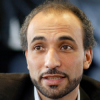Tariq Ramadan

Tariq Ramadan
Tariq Ramadanis a Swiss academic, philosopher and writer. He is the professor of Contemporary Islamic Studies in the Faculty of Oriental Studies at St Antony's College, Oxford and also teaches at the Oxford Faculty of Theology. He is a visiting professor at the Faculty of Islamic Studies, the Université Mundiapolisand several other universities around world. He is also a senior research fellow at Doshisha University. He is the director of the Research Centre of Islamic Legislation and Ethics, based in...
NationalitySwiss
ProfessionWriter
Date of Birth26 August 1962
CountrySwitzerland
Our task is to change the world for the better, not to adapt ourselves to the world.
There is the philosophy embedded in the culture we are living. It is quite clear for example that Arabs have a different culture than Malaysians.
Intellect is a part of a good faith. Intellect is the light, the heart is the direction.
To be courageous is to be a voice for the voiceless
Unfortunately there are some trends that are changing this but you don't have for example as strict and narrow understanding of the relationship between men and women. And then there is the philosophy we have to extract in the relationship between text and culture.
Your heart is the center of humility, your mind could be the source of arrogance.
If you do not have boundaries, you do not have a path.
If you know how to live, even death is good news
I wouldn't call it naïve but silly. History does not work like this. If you look at the dynamics of Eastern Europe or even Germany post reunification, you realize that change takes time. No one can deny the fact that we are still not there - I am advocating something which has to go from uprisings to revolutions. It is not coming straight away that it is not going to come but what we have to advocate is that the democratization process is always better than state dictatorship.
One does not always know how to express the sorrow of the soul. One does not always know how to silence the joy of the heart.
The philosophy of fasting calls upon us to know ourselves, to master ourselves, and to discipline ourselves the better to free ourselves. To fast is to identify our dependencies, and free ourselves from them.
If you are not at peace with yourself then you cannot spread peace.
We need modesty not only in the way we dress; we need intellectual modesty.
Instead of looking outside of ourselves and counting potential enemies, fasting summons us to turn our glance inward, and to take the measure of our greatest challenge: the self, the ego, in our own eyes and as others see us.